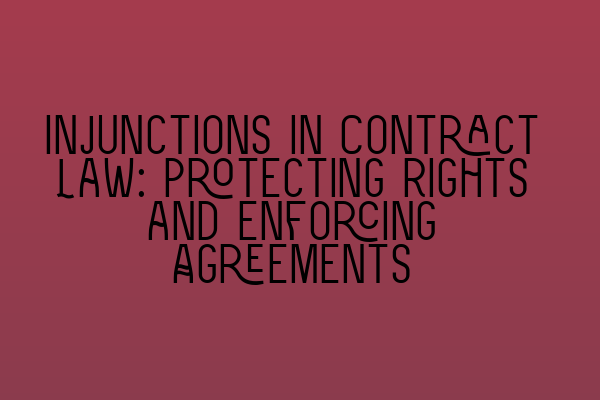Welcome to SQE Contract Law! In this blog post, we will explore the fascinating world of injunctions in contract law. Whether you’re a legal professional or just interested in understanding how contracts are enforced and rights protected, this post will provide you with a comprehensive overview.
What is an Injunction?
An injunction is a legal remedy sought by a party to a contract in order to prevent the other party from engaging in certain actions or behaviors. It is a court order that aims to maintain the status quo and uphold the rights and obligations set forth in the contract. Injunctions can be classified into two main types: prohibitory injunctions and mandatory injunctions.
Prohibitory Injunctions
A prohibitory injunction is sought when one party wants to restrain the other party from doing something that would breach the contract or cause harm or loss. For example, if Party A entered into a contract with Party B to purchase a specific piece of property, but Party B intends to sell it to someone else, Party A can seek a prohibitory injunction to prevent this sale. This type of injunction aims to maintain the status quo and protect Party A’s rights under the contract.
To obtain a prohibitory injunction, the party seeking the injunction must demonstrate the following:
- The existence of a valid contract between the parties.
- A breach of that contract by the other party.
- An actionable remedy is needed to prevent further harm or loss.
- The balance of convenience favors granting the injunction.
Prohibitory injunctions play a crucial role in contract law as they enable parties to protect their contractual rights and ensure that the terms of the agreement are honored.
Mandatory Injunctions
A mandatory injunction, on the other hand, is sought when a party wants the court to order the other party to perform a specific action or behavior. This type of injunction is used when damages are not an adequate remedy, and specific performance is necessary to enforce the contract.
For example, if Party A entered into a contract with Party B to provide a unique consulting service, and Party B refuses to fulfill their obligations, Party A can seek a mandatory injunction to compel Party B to perform the service as agreed. Mandatory injunctions can be particularly useful in cases where the subject matter of the contract is unique or of significant value.
To obtain a mandatory injunction, the following conditions must be met:
- A valid and enforceable contract exists between the parties.
- There has been a breach of that contract by the other party.
- Mandatory performance is required to enforce the contract.
- The balance of convenience favors granting the injunction.
By granting mandatory injunctions, the court ensures that contractual obligations are fulfilled and provides an effective means of enforcing agreements in situations where monetary compensation alone is insufficient.
When Can an Injunction be Granted?
An injunction can be granted by the court when certain criteria are met. These criteria include:
- There is a serious issue to be tried.
- The balance of convenience favors granting the injunction.
- There is a risk of irreparable harm if the injunction is not granted.
- There is no other adequate remedy available.
The court carefully considers these factors and assesses the merits of the case before deciding whether to grant an injunction. It is important to note that each case is unique, and the court’s decision will depend on the specific circumstances and evidence presented.
Benefits of Seeking an Injunction
Seeking an injunction can provide several benefits to a party to a contract. First and foremost, it offers a legal remedy to prevent or address breaches of contract and potential harm or loss. By obtaining an injunction, a party can protect their contractual rights and ensure that the terms of the agreement are upheld.
Injunctions also provide a swift and effective means of enforcement. Unlike other remedies, such as damages, injunctions can directly compel a party to act or refrain from acting as required by the contract. This can result in a faster resolution of contract disputes and fewer long-term damages.
Furthermore, seeking an injunction can also demonstrate to the opposing party the seriousness and determination of the aggrieved party to protect their rights. This can lead to parties reconsidering their actions or entering into negotiations to resolve the dispute outside of court.
Conclusion
Injunctions play a vital role in contract law by protecting rights and enforcing agreements. Whether seeking a prohibitory injunction to prevent breaches of contract or a mandatory injunction to compel specific performance, these legal remedies ensure that parties can rely on the terms of their agreements while providing an effective means of resolution in case of disputes.
At SQE Contract Law, we understand the importance of understanding the intricacies of injunctions and other aspects of contract law. To further enhance your knowledge and preparation for the SQE exams, we recommend exploring our SQE 1 Practice Exam Questions and SQE 1 Practice Mocks FLK1 FLK2 articles. Additionally, if you’re interested in courses to assist with your SQE 2 or SQE 1 preparation, be sure to check out our SQE 2 Preparation Courses and SQE 1 Preparation Courses.
For those planning their journey towards becoming a qualified solicitor, stay updated on the latest SRA SQE Exam Dates to ensure you’re well-prepared for success.
